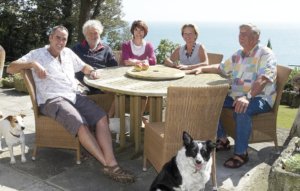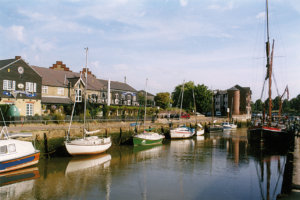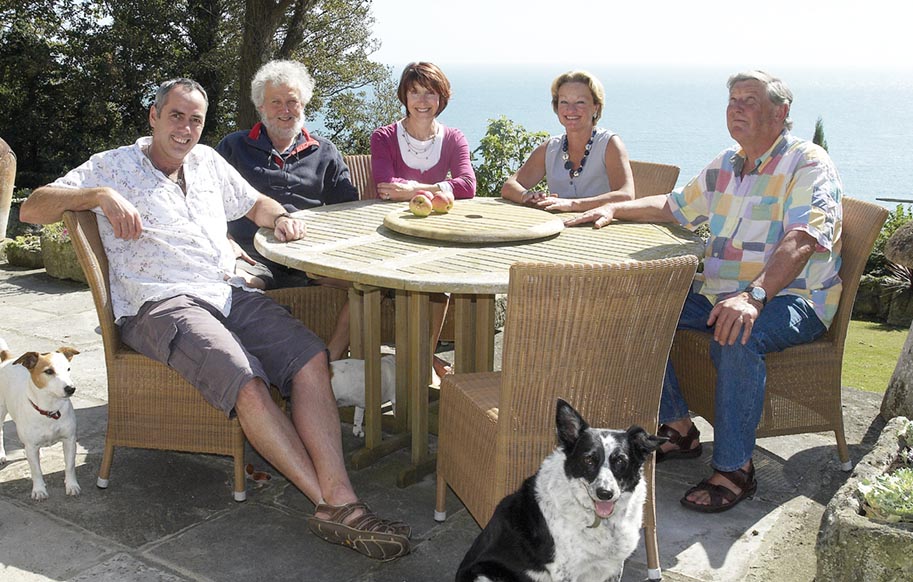 The Gibbs family have a rare instinct for success, and the whole community benefits, finds Roz Whistance.
The Gibbs family have a rare instinct for success, and the whole community benefits, finds Roz Whistance.
“The ideal opportunity is a fickle mistress,” says Neil Gibbs, grandly. And though everyone guffaws at his mock-pomposity, his wife Steph, brother Andrew, brother-in-law Meg and sister-in-law Jane all know he is absolutely right.
The Gibbs family own some of the landmark pubs on the Isle of Wight. The Spyglass Inn is marketed as synonymous with the Needles as a visitor attraction. The Bargeman’s Inn in Newport has, in its 10 years, carved out its own niche around good gravy dinners and folk music. And The Dairyman’s Daughter, at Arreton Barns, has perfected the balancing act between attracting both tourists and locals. And that’s just three.
Clearly, then, the Gibbs family have not waited for that ‘fickle mistress’ to wink her suggestive eye. This is the story of DIY opportunites, created from husks and shells, and turned to good.
It is the end of a frantic summer on Ventnor sea front. So it is hard to believe that when Neil and Steph Gibbs put in their application to licence the Spyglass Inn on Ventnor esplanade, an objection was received from the only other pub on the Esplanade, the Mill Bay, on the grounds that there wasn’t sufficient trade for one pub, let alone two. (By a sweet turn of events the family now own the Mill Bay.)
Twenty years after that objection was seen off, over a thousand meals can be served in one day at the Spyglass. But then, the building was derelict. Any dignity it might once have had as a private hotel went when it became a refuge for the DHSS, and its roof had been burnt away.
“I thought I ought to buy it,” said Neil, an antique dealer who did a spot of property development. “And I thought it ought to be a pub.” He knew nothing about catering or cellaring. “But I liked pubs and spent a lot of time in them,” he chuckles. “And Steph was a good cook.”
Many people have fancied running a pub but find there’s a lot more to it than being the genial Mine Host. But what Neil has, and shares with his brother Andrew, is an extraordinary instinct for identifying the makings of success. “Somehow we managed to turn a profit in our first year. I think the fact we knew nothing was good because we’ve just evolved it by the day.”
What they evolved was a system for getting generous portions of good food out to customers in volume.
Given their success – for more businesses were to follow – it is comforting to know that the Gibbs are Islanders through and through. Jane’s great grandmother was a seamstress for Queen Victoria, and her great grandfather was a stationmaster at Horringford, as, in a typical Island coincidence, was Steph’s great aunt. As for Neil and Andrew, they can boast that their grandchildren are sixth generation to have been associated with Ventnor front. “Our grandfather Percy Ford refurbished and opened Salt Water Baths behind the Mill Bay in 1904. His parents were in Marine Parade 1891. Our mother was born in Esplanade Road in 1913: Pop came to the Island in 1923 and had a shop in Silvermere in 1923. He adds: “A couple of the generations have gone bust – which is a lesson for us all!”
 The final third of the partnership are Meg and Rosie Mortimer. Rosie is Neil’s daughter, and it is she Neil credits with developing the winning system of swift food turnover, as well as inventing many of the dishes which are unique to the Spyglass. These skills she has passed on to her brother Henry, who is the specials cook. Meg had for years worked overseas as a yacht instructor, but when his sister married fisherman Geoff Blake he found he spent more time on the Island and his friendship with Rosie developed. Somehow it seems appropriate that Meg (really Chris) is nicknamed after Meg Mortimer of Crossroads Motel fame, for you could almost write a soap opera about the family network: Steph’s cousin owns the Royal Hotel, another cousin owns the Eversley, and her brother owns a café. An everyday tale of publicans, wine bar owners, gift shop proprietors…
The final third of the partnership are Meg and Rosie Mortimer. Rosie is Neil’s daughter, and it is she Neil credits with developing the winning system of swift food turnover, as well as inventing many of the dishes which are unique to the Spyglass. These skills she has passed on to her brother Henry, who is the specials cook. Meg had for years worked overseas as a yacht instructor, but when his sister married fisherman Geoff Blake he found he spent more time on the Island and his friendship with Rosie developed. Somehow it seems appropriate that Meg (really Chris) is nicknamed after Meg Mortimer of Crossroads Motel fame, for you could almost write a soap opera about the family network: Steph’s cousin owns the Royal Hotel, another cousin owns the Eversley, and her brother owns a café. An everyday tale of publicans, wine bar owners, gift shop proprietors…
The Spyglass had been going 10 years before Neil’s brother Andrew and wife Jane became “accidentally” involved. Andrew was a car body designer. He and Jane had lived abroad, and were on the point of sailing round the world on a retirement trip before looking for a tea room to run. However, just as the boat was packed for the world trip, Jane’s mother fell ill, and they returned to the Isle of Wight. “I saw a property, asked Neil if he wanted a part share in another pub and sold the boat,” says Andrew.
The property in question was Newport’s former squash courts. “It was frightening how big it was,” grins Andrew. Converting it took over a year, and, significantly, only local labour was used. “We don’t spend a penny off this Island if we don’t have to,” says Neil.
Just as with the Spyglass, the doom mongers were out in force. One such, who had better remain nameless said “What makes you think you can make a pub pay in Newport? Nobody else can. “But The Bargeman’s Inn kicked off as soon as it opened,” says Andrew, gently triumphant. “We employed a chap called Colin Dimmick, a publican and chef, who had run the White Hart. Colin’s great stance was ‘People like gravy’.” This seemed a reasonable truism on which to base their business. “So we went down the gravy and veg route,” says Andrew, “and never really looked back.” The Bargeman’s Inn is celebrating its 10th year.
They were still reeling from work involved converting the Bargeman’s when another pub came on the market. The family had identified a building in Shanklin as one which “ought to be bought if we ever needed another pub”. (The Gibbs talk of needing pubs like most of us talk of needing a new car.) Despite the bad timing (that fickle mistress at work) they couldn’t ignore their instinct that Shanklin needed a pub right there on the sea front, and it became the Steamer Inn. Just two years later the pub at Arreton Barns came up too – another one which, Jane says, they had thought would represent a wonderful opportunity if it ever came available.
Despite an inauspicious start – even before they had exchanged contracts on Arreton Barns, the pub burnt down – the Dairyman’s Daughter has thrived. “We see the craft village as the entertainment,” Neil says, “and invest in the businesses accordingly.” As a result the resident potter and the glassblower have gone from strength to strength in their own businesses. Recently Jane and Andrew acquired the farm land behind the barns – “We didn’t know what do to with it but thought we ought to have it” – and in collaboration with Farmer Jacks have developed their hugely successful Sweetcorn Fair, now in its third year. They also run a farm auction twice a year. Neil and Steph host an annual Beaujolais Day, when 100 people turn up for a fry-up, washed down by a bottle of the just-released Nouveau.
Which begs the question – well, don’t you have enough to do? And they smile and look content and say they do what interests them. “It’s a distraction from the pubs,” grins Andrew. “Machinery, vintage cars, they’re all things we have a personal interest in. And folk music, of course.”
So, because they like pubs in a traditional style which serve large portions and have live music, that’s what their pubs are like. The most recent acquisition, the Met wine bar in Ventnor, is an obvious departure from that, but even here Meg has beaten the designers of minimalist London chains such as All Bar One at their own game by thinking about the acoustics. He had the ceiling lowered and introduced soft furnishings, and as a result customers can hold a conversation.
Every vital detail is to the family just common sense. They know getting the right name for the pubs is vital – so they stick their suggestions in a hat. It’s a rare confidence.
Now and again people have bridled at their success. A woman once fronted up Neil, asking: “What have you ever done for this town?” She might have morphed into John Cleese asking “What did the Romans ever do for us?, because the reply was about as comprehensive.“Well, apart from spending half a million on wages a year which goes straight into local economy, and buying supplies from local businesses, and supporting the football club, the cricket club, the rugby club, the skateboard park, the enhancement fund… there isn’t a charity in the town that doesn’t come to us,” was his reply.
So what next? “We’re not after world domination,” says Andrew, as if to imply they might be after more acquisitions is ridiculous. Then: “Though if I was 20 years younger…” Meg says: “It’s not the right time for me, but I’m always up for new ideas…” And Neil chimes in with “I’m bored. I think I’m up for a project now.”



